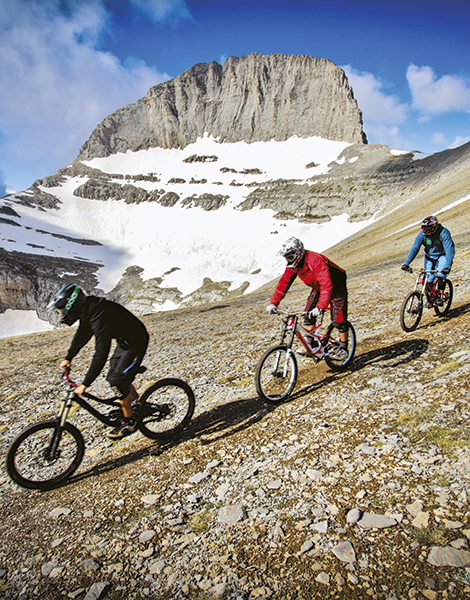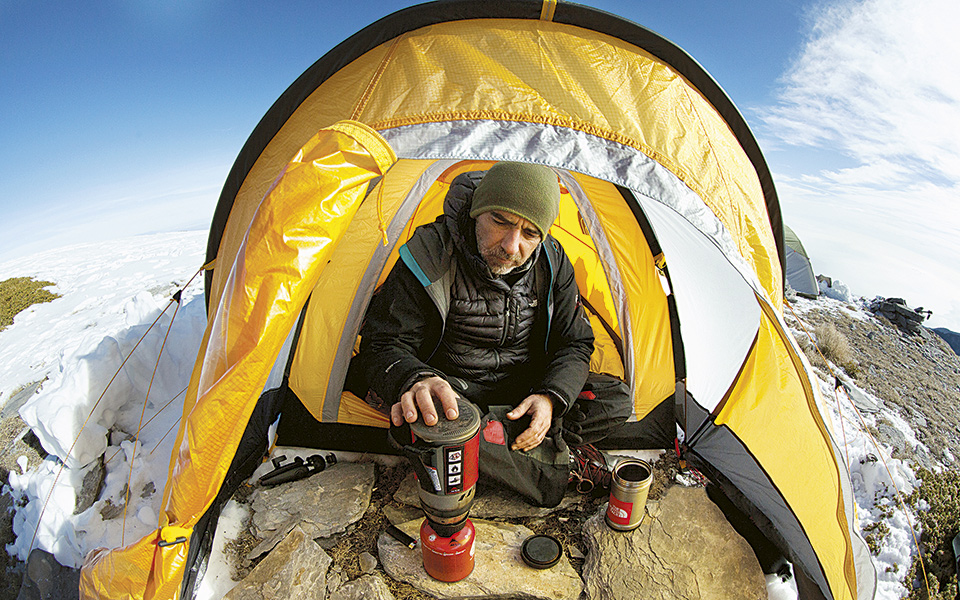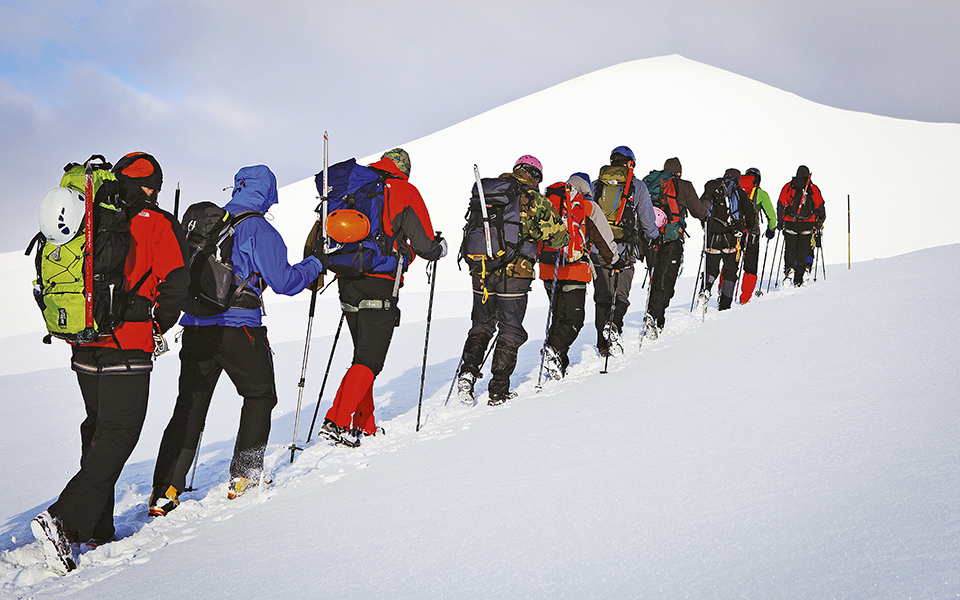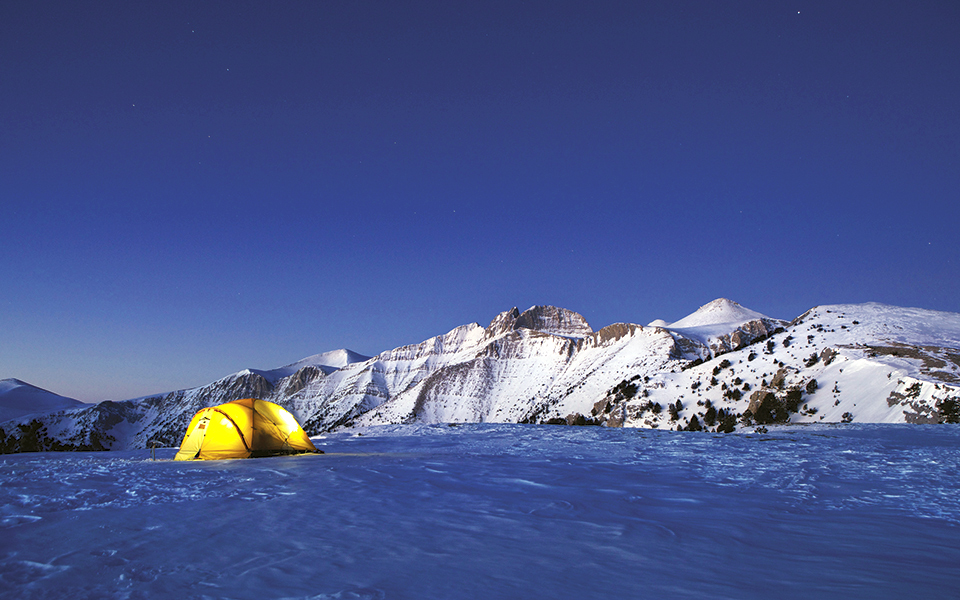“In January of 2014 I and two climber friends, Mihalis Styllas and Thoas Thomides set out to do the Kopsi tou Profiti Ilia route during the winter. It was a route that few had attempted and I happily accepted the invitation as it would be my first chance to be on such a remote and wild part of the mountain.
Everything was going as hoped until the second day when, shortly before nightfall, we realized that we had strayed from the route. Night found us at a location barely big enough for the small tent we had brought with us. The next morning we tried to keep going but that proved impossible from where we had wound up. Turning back was the only – and quite painful – option.
Many tiring hours later we ended up in a local taverna for a well-deserved hearty meal and the opportunity to warm ourselves. Listening to my two companions as they went over the events of the previous days, I realized that the wisdom to take the right decisions during difficult moments is one of the things the mountain teaches you. That and patience and respect. Even though our eyes were continually drawn upwards, turning back was the correct choice. In any event, the mountain would always be there waiting for us.”
Babis Giritziotis can talk about Mount Olympus for hours. A font of knowledge about Greece’s tallest mountain, he’ll enthusiastically propose routes depending on your skill level, whip up your excitement and puncture what he sees as the myths surrounding the fabled home of the Greek gods.
“It is a misunderstood mountain. It is much more accessible than most people think,” he says.
“I don’t see it as work, it pleases me. I feel at home. It is the beauty of the mountain, together with the legend of it that captivates you. That’s why it’s so easy to fall in love with.”

© Babis Giriziotis

© Babis Giriziotis
Giriziotis is an ‘adventure photographer‘ for Canon Greece and the official photographer of North Face Greece. He has been professionally filming and photographing the broad range of athletic events that take place on the mountain and in other natural settings since 2007. In 2010 and 2011 this work even took him to Nepal to cover a race along the Solu Khumbu Trail, a grueling ordeal that saw him cover 300 miles on foot for 15 days at an altitude of 5,500m as he followed two Greek athletes taking part in the race.
From his base in the city of Thessaloniki, Giriziotis has been regularly visiting Olympus for the past 15 years – he estimates that on average he spends 1 in 5 days on the mountain. He visits throughout the year, carrying with him his photographic as well as climbing gear. Sometimes he is alone, other times with company. “It is preferable and safer,” he says.
“I don’t see it as work, it pleases me. I feel at home. It is the beauty of the mountain, together with the legend of it that captivates you. That’s why it’s so easy to fall in love with it.”
This love recently gave rise to Mount Olympus Summits 360°, an ambitious attempt to capture the views from all 55 peaks of the mountain above 2,000m, using 360° photography both in the winter and the summer. He began the project in September of 2015, and expects to complete it over the course of the next year or so – conditions, of course, permitting.

“Speaking as a photographer, my favorite seasons on Olympus are spring and winter, because that is when the images are the most intense. Winter is particularly attractive to me: the mountain changes and offers more variety in terms of images. You can play around with it in a very special way. I always go up the mountain when the bad weather subsides in order to have a clear sky although the conditions I will encounter are always unpredictable. Often, due to the microclimate, the humidity and heavy clouds cause problems for the project as the ideal is to have a clear view of the horizon. In those cases I either need to wait or just descend again to return another day.
Patience and respect are anyway the alpha and the omega at high altitudes. You don’t go to conquer the place, but to see beautiful things and have a nice time, feeling safe. In order to achieve that you need to know when to stop and turn back.”
At the project’s site, visitors can already take a digital tour of many of Olympus’s peaks and read more about Giriziotis’s experiences climbing and photographing the mountain. A key goal is to shine a light on Olympus’s lesser-known aspects and hopefully inspire others to discover the mountain of the gods.
“Just as a mountain is not just its peak, so too Olympus is not just Mytikas,” he says referring to Olympus’s tallest point. You will see everyone from amateur climbers walking with simple hiking boots to top-level rock climbers deftly climbing a cliff-face. At the Plateau of the Muses you will see 75-year-olds walking uphill with less difficulty than others much younger than them.”
“The main paths are very well marked, and now thanks to the mountain running competitions new routes have been signposted at lower altitudes. There are however spots that I don’t know at all, whether because they are very hard to get to, or just because I haven’t made it there yet. No matter how many years one spends climbing Olympus, there will always be new places to discover…”
“Patience and respect are anyway the alpha and the omega at high altitudes. You don’t go to conquer the place, but to see beautiful things and have a nice time, feeling safe”

FAVORITE ROUTES
1. Natsis Pass – An alpine climb with an incredible view in all directions, particularly towards Megala (Large) Kazania. The route begins from the saddle of Strivada which is located between the two tallest peaks of Olympus, Mytikas (2,917) and Stefani (2,909).
2. Kopsi (Cut) of Skolios – A tough route as the 1,600m difference in elevation needs to be covered in only 4.8 km. It offers impressive views and you will certainly forget all about the painful uphill once standing on the peak of Skolios at an altitude of 2,905m
3. The Plateau of the Muses (for beginners) – One of the more well-known routes, and an excellent starting point for all those making their first trip to Olympus. It is well-marked (part of the European E4 route) and begins at the site of Gortsia, where visitors can leave their cars. After a 14 km hike of (about 5-6 hours) you will arrive at the Plateau of the Muses. The view from the peak of Skourtas towards the taller peaks of Olympus is particularly stunning.
4. The Plateau of the Muses (advanced) – this quite challenging route begins from Skalas Peak (2,882m), reaches Mytikas, Olympus’s tallest peak (2,917m), and ends on the Plateau of the Muses. Those attempting to do this route for the first time without a guide should take particular care and make sure to have studied the route well before setting off. But the view in all directions is simply breathtaking.












